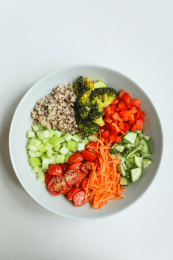Your colon, a.k.a. your large intestine, is home to 100 trillion bacteria. They represent some 1,200 different species, which have evolved over millennia. In fact, your gut has about four pounds of bacteria that entered your system from food and the environment. This may sound like a bad thing. But, research shows that those bacteria are crucial to your health. Among other things, they:
- Digest fiber, along with other parts of food that you couldn’t digest otherwise.
- Produce and activate B vitamins and vitamin K.
- Release beneficial chemicals in food – including ones that may prevent cancer.
- Activate your immune system (especially important during the cold and flu season).
- Prevent “bad” bacteria from taking over and making you sick.
Evidence shows that gut bacteria probably influence our risk for many health problems, including obesity, type 2 diabetes, and certain autoimmune diseases. For example, lean people appear to have different gut bacteria than people who are obese, but scientists are only beginning to understand why. New research also shows that our personal bugs may affect mental health conditions, such as depression and anxiety.
So, while scientists are busy examining bacteria in poop samples, we can engage in a more enjoyable task. Focus on feeding the good bacteria in your gut so they can thrive and you can, too. The best food for intestinal bugs comes from plant-based fiber. The more kinds the better, so eat a wide range of fiber-rich vegetables, whole grains, beans, legumes, nuts and seeds. Diversify your diet, and get busy feeding those hardworking bugs.
By: Jamie Rathbun
